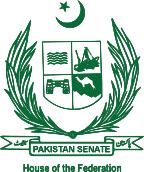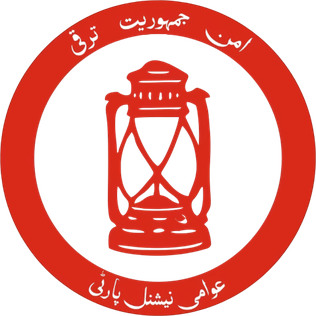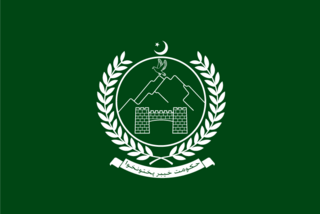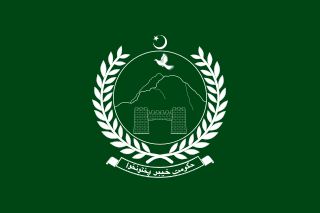
West Pakistan was the western polity of Pakistan, it was one of the two provincial exclaves created under the One Unit Scheme in 1955 in Pakistan. It was created to ensure population-based equality with its eastern counter-part and it was dissolved to once again form former provinces for the General Elections in 1970 under the 1970 Legal Framework Order.

The Senate of Pakistan or Aiwān-e-Bālā Pākistān, constitutionally House of the Federation is the upper legislative chamber of the bicameral parliament of Pakistan. As of 2023, It has a total of 100 seats, of which 92 are elected by the provincial legislatures of Pakistan, with equal representation of 23 seats for all provinces, using indirect single transferable votes, while 4 represent the Federal Capital and the remaining 4 are representing FATA, until membership expiration in 2024. Elections are held every three years for one half of the house, each Senator has a term of six years. Unlike the National Assembly, the Senate is a continuing chamber and hence not subject to dissolution.

The Parliament of Pakistan is the federal and supreme legislative body of Pakistan. It is a bicameral federal legislature that consists of the Senate as the upper house and the National Assembly as the lower house. According to the Constitution of Pakistan, the President of Pakistan is also a component of the Parliament. The National Assembly is elected for a five-year term on the basis of adult franchise and one-man one-vote. The tenure of a Member of the National Assembly is for the duration of the house, or sooner, in case the Member dies or resigns. The tenure of the National Assembly also comes to an end if dissolved on the advice of the Prime Minister or by the president in his discretion under the Constitution.

Bangladesh elects on national level a legislature with one house or chamber. The unicameral Jatiyo Sangshad, meaning national parliament, has 350 members of which 300 members are directly elected through a national election for a five-year term in single-seat constituencies while 50 memberships are reserved for the women who are selected by the ruling party or coalition. The Prime Minister is the head of the government. The president who is the head of the state is elected by the National Parliament. The president of Bangladesh is a ceremonial post and does not exercise any control over the running of the state.

Since its establishment in 1947, Pakistan has had an asymmetric federal government and is a federal parliamentary democratic republic. At the national level, the people of Pakistan elect a bicameral legislature, the Parliament of Pakistan. The parliament consists of a lower house called the National Assembly, which is elected directly, and an upper house called the Senate, whose members are chosen by elected provincial legislators. The head of government, the Prime Minister, is elected by the majority members of the National Assembly and the head of state, the President, is elected by the Electoral College, which consists of both houses of Parliament together with the four provincial assemblies. In addition to the national parliament and the provincial assemblies, Pakistan also has more than five thousand elected local governments.

The Awami National Party is a Pashtun nationalist, secular and leftist political party in Pakistan. The party was founded by Abdul Wali Khan in 1986 and its current president is Asfandyar Wali Khan, grandson of Bacha Khan, with Mian Iftikhar Hussain serving as the Secretary-General. Part of the PPP-led cabinet of the Pakistani government during 2008−13, ANP's political position is considered left-wing, advocating for secularism, public sector government, and social egalitarianism.

The East Pakistan Provincial Assembly, known as the East Bengal Legislative Assembly between 1947 and 1955, was the provincial legislature of East Pakistan between 1947 and 1971. It was known as the East Bengal Assembly from 1947 to 1955 when the provincial name was changed. The legislature was a successor to the Bengal Legislative Council and the Bengal Legislative Assembly, which were divided between East Bengal and West Bengal during the partition of Bengal in 1947. It was the largest provincial legislature in Pakistan. Elections were held only twice in 1954 and 1970.

The Chief Minister of Khyber Pakhtunkhwa is the head of government of the Pakistani province of Khyber Pakhtunkhwa. The chief minister leads the legislative branch of the provincial government, and is elected by the Provincial Assembly. Given that he has the confidence of the assembly, the chief minister's term is for five years and is subject to no term limits. Azam Khan is the current caretaker chief minister of Khyber Pakhtunkhwa.

General elections were held in Pakistan on 7 December 1970 to elect members of the National Assembly. They were the first general elections since the independence of Pakistan and ultimately the only ones held prior to the independence of Bangladesh. Voting took place in 300 general constituencies, of which 162 were in East Pakistan and 138 in West Pakistan. A further thirteen seats were reserved for women, who were to be elected by members of the National Assembly.

The Provincial Assembly ofKhyber Pakhtunkhwa is a unicameral legislature of elected representatives of the Pakistani province of Khyber Pakhtunkhwa, which is located in Peshawar, the provincial capital. It was established under Article 106 of the Constitution of Pakistan, having a total of 145 seats, with 115 general seats, 26 seats reserved for women and 4 reserved for non-Muslims. The 11th Provincial Assembly of the Khyber Pakhtunkhwa was dissolved on 18 January 2023, and the province is set to elect a new legislature on 8 October 2023.

The Election Commission of Pakistan is an independent, autonomous, permanent and constitutionally established federal body responsible for organizing and conducting elections to the national parliament, provincial legislatures, local governments, and the office of President of Pakistan, as well as the delimitation of constituencies and preparation of electoral rolls. As per the principles outlined in the Constitution of Pakistan, the Commission makes such arrangements as needed to ensure that the election is conducted honestly, justly, fairly and in accordance with law, and that corrupt practices are guarded against. The Election Commission was formed on 23 March 1956 and has been restructured and reformed several times throughout the history of Pakistan.

The Governor of Balochistan is the head of the province of Balochistan, Pakistan. The post was established on 1 July 1970, after the dissolution of West Pakistan province and the end of One Unit. Under Pakistan's current parliamentary system, the governorship is a ceremonial position, as a symbol of the federation. The governor is appointed by the centre, whereas the principal head of the provincial government remains the elected Chief Minister of Balochistan.
The Constitution of 1962 was the fundamental law of Islamic Republic of Pakistan from 8 June 1962 until martial law was declared in 25 March 1969. It was abrogated on 25 March 1969 by President Yahya Khan.

General elections were held in British India in December 1945 to elect members of the Central Legislative Assembly and the Council of State. The Indian National Congress emerged as the largest party, winning 57 of the 102 elected seats. The Muslim League won all Muslim constituencies, but failed to win any other seats. Of the 13 remaining seats, 8 went to Europeans, 3 to independents, and 2 to Akali candidates in the Sikh constituencies of Punjab. This election coupled with the provincial one in 1946 proved to be a strategic victory for Jinnah and the partitionists. Even though Congress won, the League had united the Muslim vote and as such it gained the negotiating power to seek a separate Muslim homeland as it became clear that a united India would prove highly unstable. The elected members later formed the Constituent Assembly of India.
Legislative elections were held in East Bengal between 8 and 12 March 1954, the first since Pakistan became an independent country in 1947. The opposition United Front led by the Awami League and Krishak Sramik Party won a landslide victory with 223 of the 309 seats. The Muslim League Chief Minister of East Pakistan Nurul Amin was defeated in his own constituency by Khaleque Nawaz Khan by over 7,000 votes, with all the Muslim League ministers losing their seats.

Provincial elections were held in the Pakistani province of Sindh to elect the members of the 12 Provincial Assembly of Sindh on 11 May 2013, alongside nationwide general elections and three other provincial elections in Khyber Pakhtunkhwa, Balochistan and Punjab. The remaining two territories of Pakistan, AJK and Gilgit-Baltistan, were ineligible to vote due to their disputed status.
Provincial elections were held in the Pakistani province of Punjab to elect the 15th Provincial Assembly of the Punjab on 18 February 2008, alongside nationwide general elections and three other provincial elections in Sindh, Balochistan and North-West Frontier Province. The remaining two territories of Pakistan, AJK and Gilgit-Baltistan, were ineligible to vote due to their disputed status.
Provincial elections were held in the Pakistani province of Punjab to elect the 14th Provincial Assembly of the Punjab on 10 October 2002, alongside nationwide general elections and three other provincial elections in Sindh, Balochistan and North-West Frontier Province. The remaining two territories of Pakistan, AJK and Gilgit-Baltistan, were ineligible to vote due to their disputed status. The elections were held under the military government of General Pervez Musharraf. The elections saw an end to the two-party system between the Pakistan Peoples Party and the Pakistan Muslim League (N), with the right-of-centre Pakistan Muslim League (Q) emerging as a third main party supporting Musharraf.
Provincial elections were held in the Pakistani province of North-West Frontier Province to elect the members of the 8th Provincial Assembly of North-West Frontier Province on 10 October 2002, alongside nationwide general elections and three other provincial elections in Sindh, Balochistan and Punjab. The remaining two territories of Pakistan, AJK and Gilgit-Baltistan, were ineligible to vote due to their disputed status. The elections were held under the military government of General Pervez Musharraf.














